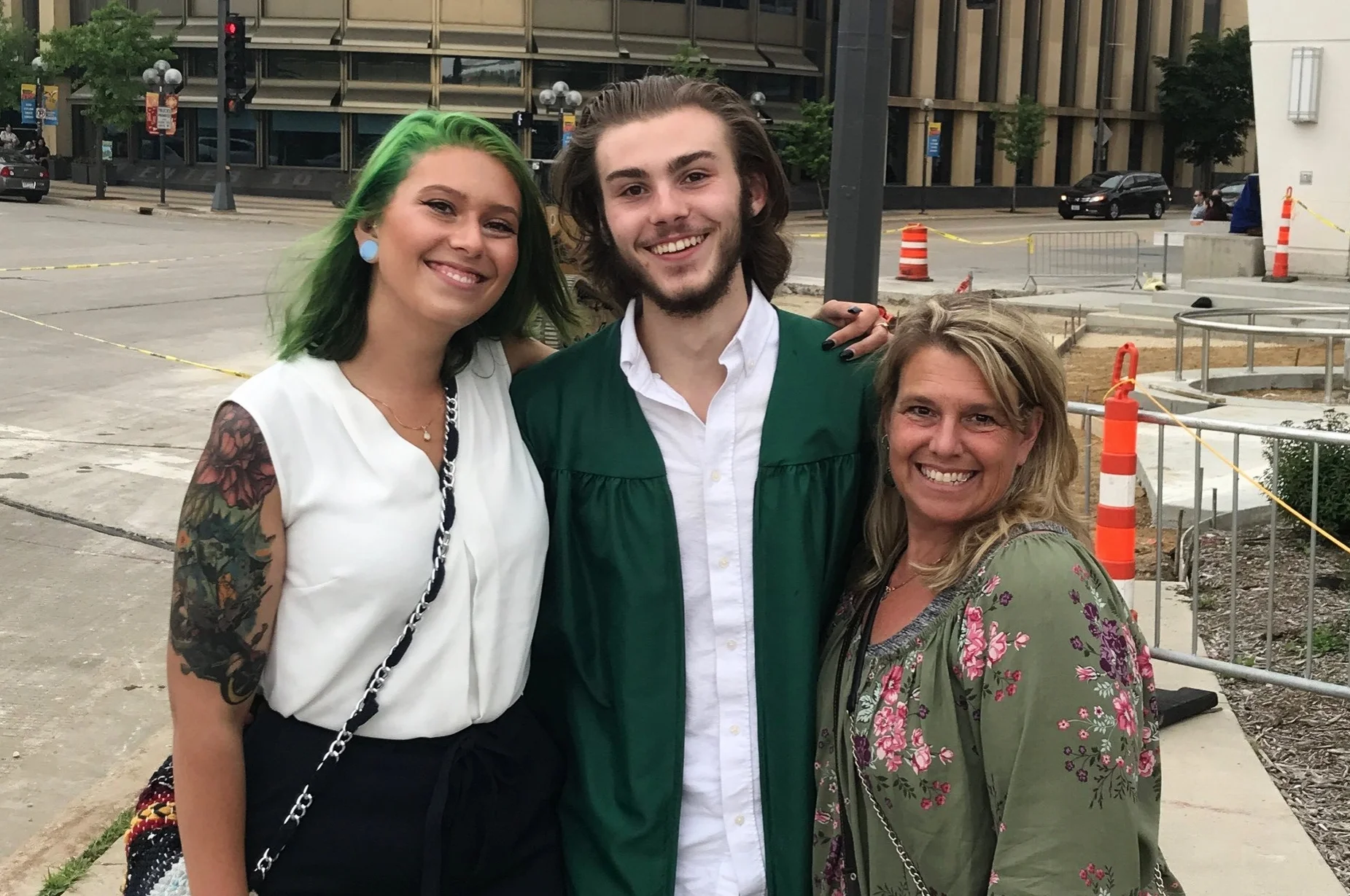'I know that he loved me': One family's journey as survivors of suicide
“Appreciate what you have because you might not always have it. People, how your life is. It takes one tragedy and it changes everything.”
Jody Peterson’s wisdom comes from hard knowledge. Her partner of 24 years, and husband of 19, took his own life on January 8, 2018.
His name was William “Bill” Peterson. He was a loving husband, a doting father, an immense artistic talent, a fine-dining chef, and punk rocker. An ally to children, Alcoholics Anonymous members, and animals.
In the nine months since his passing, Jody has undergone a grieving process familiar to far too many.
“After Bill died, I was pretty numb, not very emotional about it,” Jody told me recently. “I’d cry a little bit, but mostly, I just didn’t want to think about him at all. That’s how I stayed for a couple of months. I couldn’t even look at a picture of him because I was so, I would say angry, at him.”
That’s a common trait among survivors of suicide, according to Heidi Smith of Seasons Hospice’s Center for Grief Education and Support (CGES). There, in a cozy room complete with rocking chairs, couches, and a fireplace, “We try to normalize and do grief education so that they understand they’re not going crazy, their body is not falling apart — it’s just how grief is impacting them.”
As a nonprofit hospice, Seasons has been required to provide bereavement services for its 21 years of existence. That mission now includes outreach to students at all three public high schools, during which Smith and her colleagues have encountered a growing number of suicides.
Bill with his daughter, Johanna
This led Smith and Tim Haskamp to receive training through the American Foundation of Suicide Prevention, and on September 20, 2017, hold the first Survivor of Suicide group at CGES.
Their group meets from 6 to 7:30 p.m. on the third Wednesday of each month at the Seasons Hospice business office, 1696, Greenview Drive SW. The group meets next on Wednesday, October 17 from 6 to 7:30 p.m.
A different suicide survivor group meets from 7 to 8 p.m. on the third Thursday of every month in Room 221 of Evangel United Methodist Church, 2645 North Broadway, Rochester. For more information, contact Barb Powell by phone at 507-226-8095 or at barbpowell@charter.net.
CGES also offers a Veteran’s Group, which meets every other Monday, 6 to 7:30 p.m. Haskamp, who runs the group with a pair of combat veterans, said it’s an informal group meant to allow veterans to talk about issues from loss of innocence to transitioning back into civilian life. Talking about their inner turmoil may help prevent them from something potentially harmful.
‘I admire him a lot’
Grief follows any death, but suicide is different. It seems to happen out of nowhere, without reason, and — because of the stigma surrounding it — rumors often fill the silence left by shame.
Many people feel guilt, as if they should have done something differently. Some people react by losing faith in their religions, while non-religious people seek answers in spirituality. Grief can also take a toll on the body: things like panic attacks, anxiety, short-term memory loss, anger.
“I don’t know that you ever move on, but you can make some sense out of it, and have a re-defined purpose, and let go of that blame,” said Haskamp. “The more we keep it under wraps, it’s going to come out in other ways.”
This fall, CGES’s groups will make physical masks symbolic of the mask they wear to disguise their grief in public. The artworks will be displayed in the skyway between Rochester Public Library and the Civic Center.
For Jody Peterson, smiles are becoming more genuine than masks.
“I feel kind of like now I’m kind of getting back into my happy place, remembering all the good things about him, where it’s really taken me like six months to kind of let go of all the hurt and the bad,” said Jody.
Her husband’s bi-polar disorder and depression manifested themselves as delusional, paranoid thoughts. Bill called these thoughts ‘tapes.’ They told him that his doctors, family, friends, or even Jody were out to get him, or had ceased believing in him. During low periods, tapes looped endlessly in his head, no matter what he tried.
Watercolor by Bill Peterson
“I admire him a lot,” said Jody. “I mean, he did what he was supposed to do, stay away from alcohol, took his medications.”
He also turned to art, mindfulness, and journaling. Still, his mind pressed play and weight-gain spurred on by high doses of anti-psychotic medications caused him to develop diabetes.
Close to a dozen times that Jody knows of during their relationship, the tapes brought Bill low enough to attempt suicide.
“There could’ve been other ones, but I don’t know about them, because he probably hid them from me,” she said. “We kind of had this protocol where, he’d go get beer, I’d know that something was going to happen, and then I’d be on alert, and then he would tell me about a plan and I’d bring him in.”
But Bill’s last three attempts were different. He tried to overdose on prescription medications. In both instances Jody found him in time to call an ambulance.
“Then, the last time, there were no signs,” she recalled. “Usually I could see, like, he was talking about doctors were against him, so-and-so were against him, nobody understands him, he’s sick of his mental illness, sick of doctors ... but there wasn’t any of that this time.”
Honoring the life
Most of the time, according to Smith, friends and family have no idea what someone intent on suicide is thinking.
“Often they seem more content with life just prior to completing their suicide, which leaves those close to them even more baffled and confused,” said Smith. “Even with multiple attempts, we never think they will ‘do it.’”
If a support like Jody can be taken by surprise, anyone can. Early in their marriage, she had made a definitive choice to stick by Bill, despite his ups and downs with crisis thinking.
Her mother, another of Bill’s big supports, suggested that they attend a free ten-week class called Family Matters through the National Alliance on Mental Illness. The course taught mental illness from a biological and medical standpoint and offered coping methods and strategies for family members. It also taught Jody the empathy she needed to help Bill. (NAMI still offers a course like this; it’s called Family-to-Family and is still free. To learn more, visit NAMI’s website, or call Anita Otterness at 507-316-0990.)
“You have to be healthy for the kids, you have to be healthy for Bill, because if you let the mental illness consume the whole family, then everybody’s sick,” said Jody.
She and Bill protected the kids from knowing about his suicide attempts when they were young, but opened up later.
“When they got a little older, Bill was really good about saying, ‘I’m sorry that I tried to kill myself. I hope your forgive me.’ He was more open with it as they got older,” she said.
She also learned to cultivate his trust, even if it meant going along with decisions she disagreed with, like when Bill cut off ties with his family.
A month or two after Bill’s death, Jody mentioned to a friend that she felt both free and untethered. Free to do her own thing, but untethered from the consistent, safe influence of her life partner.
“We were never allowed to have lawn signs in our lawn because then people would know our political views,” said Jody. “I always wanted to have lawn signs, so I’m like, I could have a lawn sign, and it would be okay. Bill wouldn’t like it, but it would be okay.”
She hasn’t made up her mind about a lawn sign for the midterms, but she’s made an even bigger decision; she and her daughter Johanna took a trip to New York City with Bill’s mother this summer. Tear-filled memory sessions proved cathartic for them, especially Bill’s mother, who grappled with guilt.
Their re-grouping to mourn is a step in the right direction, said Haskamp.
“Suffering is part of life, and suffering is not something we can run away from. The challenge is being open to it, and trying to learn from it,” said Haskamp, who, along with Smith, advocates “honoring the life versus focusing on the trauma of their death.”
‘I know that he loved me’
The Petersons are finding that path fulfilling.
This summer’s been good for Jody. With her free time, she and her son cleaned out their garage. During that process, they uncovered happy memories of Bill.
“That’s been really healing for me,” said Jody. “Because the last three years up to his suicide were hard.”
Johanna’s arm, with artwork from Bill’s ongoing coming series, “Angst and Innocence”
She is back teaching and still lives in the home she and Bill created together, finding comfort in the handy-work of her late husband that still supports the house.
Their daughter Johanna is a senior in college set on becoming a peace-maker in the world with her father’s artwork tattooed on her arm. Their son William graduated high school last spring and is teaching himself to be a mechanic, the same way his father taught himself to draw.
When Jody dismantled her husband’s art studio, she found all kinds of pieces she’d never been allowed to see; a bittersweet glimpse into an artist who was so secretive that he hid even his grand romantic gestures. For example: Jody had no idea that the main characters in his published strip, “Angst and Innocence,” were a tribute to their relationship until she read about it in an interview. Bill had been drawing the strip for years prior to that interview.
“I feel like I did the best I could and that I was the best support I could be,” said Jody. “I know that he loved me and I loved him.”
The Out of the Darkness Suicide Prevention Walk takes place from 9 a.m. to 1 p.m.on Saturday, September 29 at Bear Creek Park. For more information, contact Cassandra Linkenmeyer at 507-721-8246 or clinkenmeyer@afsp.org.
Bryan Lund is a freelance writer from Rochester. Fresh off a two-year stint on the editorial board at the Post-Bulletin, he covers politics, art and gnarly feats of grace. Follow him on Twitter.
Cover photo: Survivors of Bill’s death. Left to right, Johanna (daughter), William (son) and Jody (wife).










